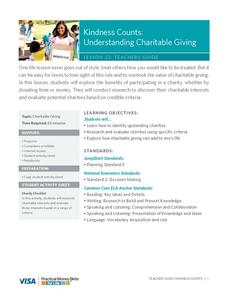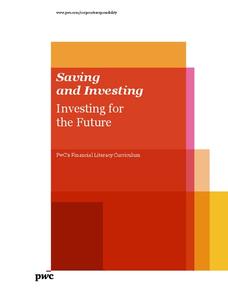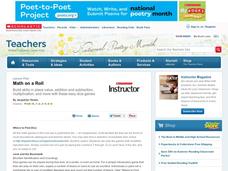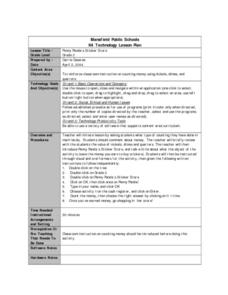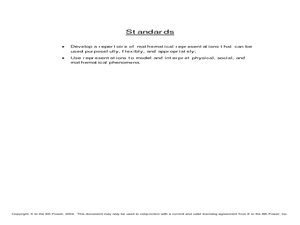Curated OER
A Visit to the Mint
Emerging consumers recognize the types and denominations of U.S. currency. They listen to a guest speaker (if possible) and view a video. They create their own money using styrofoam and a toothpick for engraving. Consider creating a...
Visa
Kindness Counts: Understanding Charitable Giving
Financial literacy is generally focused on personal spending and saving, but consider an opportunity to talk to your pupils about how charitable giving can also factor into money management and how it can enhance life for both oneself...
PwC Financial Literacy
Saving and Investing: Investing for the Future
A fine lesson on saving and investing is here for you and your middle schoolers. In it, learners explore the values of time and money, and discover how small amounts of money invested over time can grow into a large "pot of gold." They...
Elementary AMC
Earth Day Math
Take some time this Earth Day to nourish the growth of your young mathematicians with this series of task cards. Whether it's the four basic operations, place value, money, or elapsed time, these conservation-themed problems will engage...
Curated OER
Math on a Roll
Students practice various math skills using a polyhedral die. In this dice game lesson, students practice multiplication, addition, place value, and money using games. Standard dice may be used instead of a polyhedral die with...
Curated OER
Coins Values
In this early childhood problem solving instructional activity, students read 6 statements and then identify the coin that matches the information provided in each statement.
Curated OER
How Much Is It?
Students explore foreign currencies. In this foreign currencies lesson, students simulate travel to another country and determine the value of the US dollar compared to other countries. Students use a conversion table and search Internet...
Curated OER
Why Does Money Have Value?
Students study money and its value and usage in the world today. In this economic lesson, students research money as they learn what it stands for, why it is important, how it is valued and what it represents in the United States.
Curated OER
How Much for Your Name?
Students create different coin combinations for a single amount, practice counting, demonstrate their knowledge of the value of coins and demonstrate their knowledge of coin combinations.
Curated OER
Shared and Guided Reading with Ice Cream Money
Here is a instructional activity which has students locate an exclamation point and a comma from the text. They locate previously learned words on the page, and create a word map from the word "Money." Students write about and illustrate...
Curated OER
Introduction To Markets - Lesson Plan: 1 X 1 Hour Lesson
High schoolers study the concept of a market. They determine the different purposes of buyers and sellers. They look at the utility of an item and how the value for money affects the decision making of consumers.
Kiwi Crate
Shopping on a Budget
Print some money with a resource on dollars and cents. Combined with a lesson plan about budgeting, the currency includes $1, $5, and $10 bills, coins of varying value, and a platinum credit card.
Curated OER
Common Sense Cookie Shop
First graders shop for a bag of cookies using toy money. In teams, they choose which variety to buy and decides which bills and coins are necessary to buy the bag of cookies and a cashier makes change. They tally the cookies purchased...
Curated OER
Super Bucks
Students examine paper currency for its artistic value. They design their own piece of currency based on the artistic methods used in the design of real money.
Curated OER
Penny Panda's Sticker Store
Second graders practice counting money using nickels, dimes, and quarters. They review the value of nickels, dimes and quarters. They explore Penny Panda's Sticker Store, and talk a little about what the object of the activity is (save...
Curated OER
Labor, Choice, and Sales Tax
Students consider the idea of earning and spending money. In this money management lesson plan, students discuss the concept of saving and spending money through the reading of a story and by completing several activities that involve...
Curated OER
Uncle Jed's Barbershop
Fourth graders examine productive resources. For this economics lesson, 4th graders read a book about a man who saves money to buy his own barbershop. After reading, students get into groups to play a game to learn about savings.
Curated OER
Exponents
In this exponents worksheet, 8th graders solve 16 various types of problems from writing patterns in exponential form to word problems that determine how much greater mass is and how much money was received. They simplify and rewrite...
Curated OER
Lesson 9: Tracking Commodities
Over the corse of a month, small groups will monitor the price of a specific energy commodity and analyze it in relation to global and domestic events. They play a trade simulation game and create infographics showing what they've...
Curated OER
Count, Compare and Make Change
Second graders review the value of coins and how to make change. In this counting money instructional activity, 2nd graders compare coins, practice making change, and review the value of coins using hands-on activities.
Curated OER
Cent Sense
Students identify money values. In this money instructional activity, students sort and group coins by value and investigate the cost of supplies needed for a snack. Students prepare snacks for a snack sale.
Curated OER
How Many? How Much?
First graders recognize and learn the value of coins. In this instructional activity on money, 1st graders read the book Monster Money by Grace Maccarone, discuss the role of money in society, identify various coins, and explore making...
Curated OER
The Dollar Cookie
Second graders recognize, count, and write money amounts using the cent symbol and identify equivalent amounts of money. In this money lesson plan, 2nd graders add money amounts using plastic coins and magnetic money.
Curated OER
Decimal Notation for Pennies and Dimes
Second graders write money in decimal form. In this money lesson, 2nd graders discuss the value of coins and find the placement of the decimal in writing the amount. They find the fractional parts of coins in a dollar.



